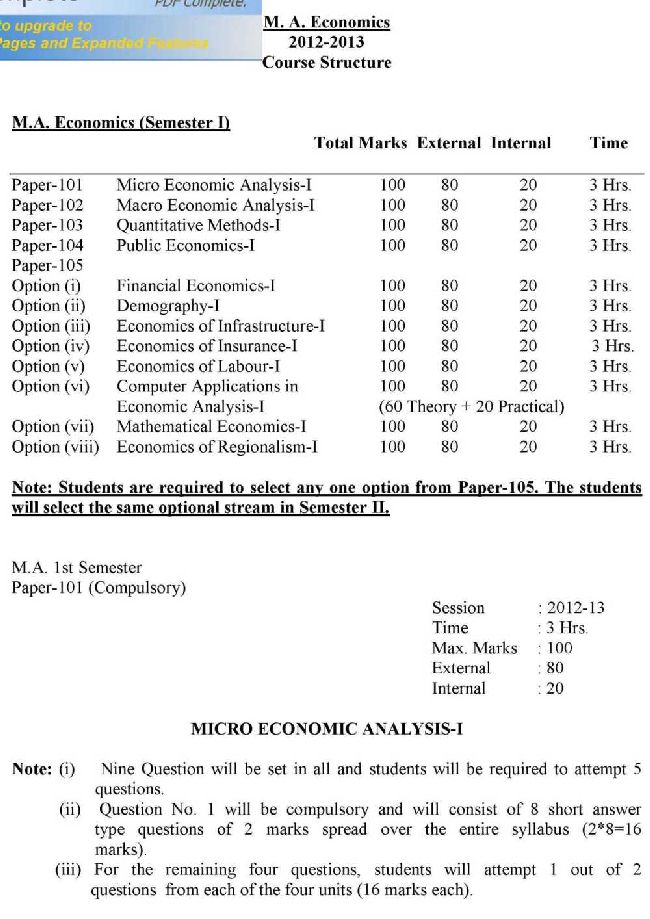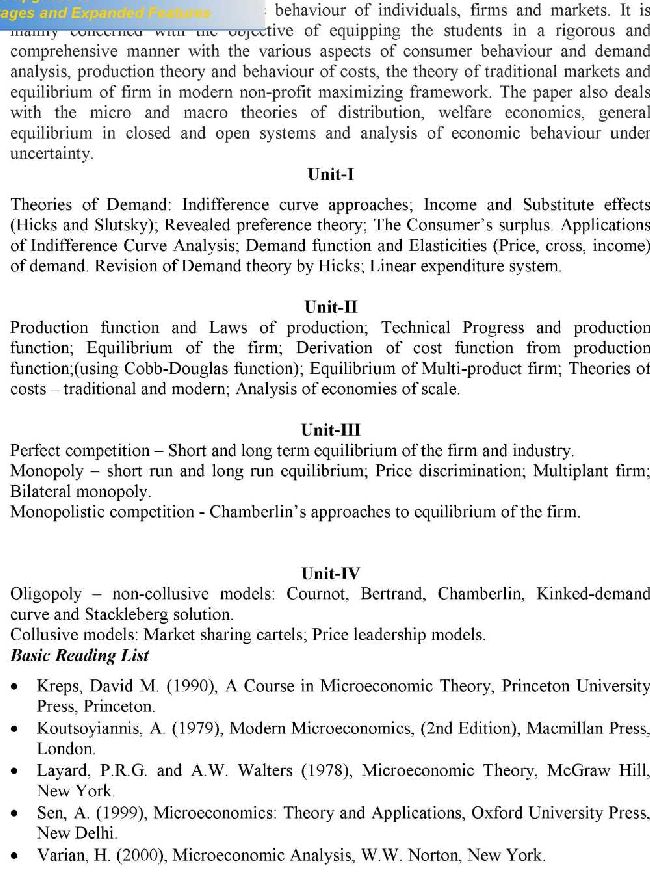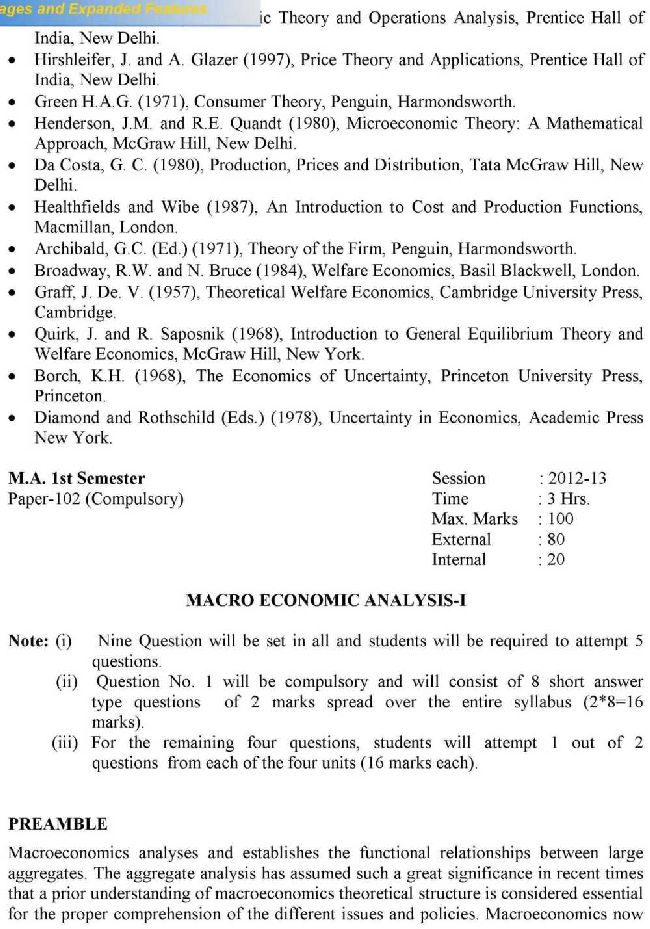|
#1
| |||
| |||
|
Hello sir I am doing MA economics from Kalyani university for study plan here I have come to get syllabus of this program can you plz provide me ??? Don’t worry I will providing you the syllabus of the MA Economics of the Kalyani university. the syllabus of the MA Economics of first sem consisit of the following subjects that are: Micro Economic Analysis- Paper-102 Macro Economic Analysis- Paper-103 Quantitative Methods- Paper-104 Public Economics-. Paper-105 Option (i) Financial Economics-I Option (ii) Demography-I Option (iii) Economics of Infrastructure-I Option (iv) Economics of Insurance-I Option (v) Economics of Labour-I . Option (vi) Computer Applications Economic Analysis-I (60 Theory + 20 Practical) Option (vii) Mathematical Economics-I Option (viii) Economics of Regionalism-I in second sem the subjects are: Micro Economic Analysis- Paper-202 Macro Economic Analysis-II Paper-203 Quantitative Methods-II Paper-204 Public Economics-II Paper-205 Option (i) Financial Economics-II Option (ii) Demography-II Option (iii) Economics of Infrastructure-II Option (iv) Economics of Insurance-II Option (v) Economics of Labour-II Option (vi) Computer Applications in Economic Analysis-II (60 Theory + 20 Practical) Option (vii) Mathematical Economics- the syllabus consisit in the file given below: Ma Economics Syllabus of the Kalyani university    Last edited by Aakashd; March 7th, 2020 at 10:00 AM. |
|
#2
| |||
| |||
|
Kalyani university department of economics offered M.A. in 'Economics' - a two-year post-graduate degree in following Specialisations Agricultural Economics Population Economics International Economics Econometrics Planning, Input-Output Economics and Industrial Organisaton Natural Resources and Environmental Economics Financial Economics Comparative Economic Systems Mathematics for Economics Applied Econometrics As you are looking for syllabus of MA economics so here I am providing for you Kalyani university MA Economics syllabus Paper-101 Micro Economic Analysis-I Paper-102 Macro Economic Analysis-I Paper-103 Quantitative Methods- Paper-104 Public Economics-I Paper-105 Option (i) Financial Economics-I Option (ii) Demography-I Option (iii) Economics of Infrastructure-I Option (iv) Economics of Insurance-I Option (v) Economics of Labour-I Option (vi) Computer Applications in Economic Analysis-I (60 Theory + 20 Practical) Option (vii) Mathematical Economics-I Option (viii) Economics of Regionalism-I Unit-I Theories of Demand: Indifference curve approaches; Income and Substitute effects (Hicks and Slutsky); Revealed preference theory; The Consumer’s surplus. Applications of Indifference Curve Analysis; Demand function and Elasticities (Price, cross, income) of demand. Revision of Demand theory by Hicks; Linear expenditure system. Unit-II Production function and Laws of production; Technical Progress and production function; Equilibrium of the firm; Derivation of cost function from production function;(using Cobb-Douglas function); Equilibrium of Multi-product firm; Theories of costs – traditional and modern; Analysis of economies of scale. Unit-III Perfect competition – Short and long term equilibrium of the firm and industry. Monopoly – short run and long run equilibrium; Price discrimination; Multiplant firm; Bilateral monopoly. Monopolistic competition - Chamberlin’s approaches to equilibrium of the firm. Unit-IV Oligopoly – non-collusive models: Cournot, Bertrand, Chamberlin, Kinked-demand curve and Stackleberg solution. Collusive models: Market sharing cartels; Price leadership models. Basic Reading List • Kreps, David M. (1990), A Course in Microeconomic Theory, Princeton University Press, Princeton. • Koutsoyiannis, A. (1979), Modern Microeconomics, (2nd Edition), Macmillan Press, London. • Layard, P.R.G. and A.W. Walters (1978), Microeconomic Theory, McGraw Hill, New York. • Sen, A. (1999), Microeconomics: Theory and Applications, Oxford University Press, New Delhi. • Varian, H. (2000), Microeconomic Analysis, W.W. Norton, New York. Unit-I National Income and Accounts Circular Flow of Income in two, three and four-sector economy; different forms of national income accounting – social accounting, input-output accounting, flow of funds accounting. Consumption function Keynes’ Psychological law of consumption – implications of the law; Empirical evidence on consumption function; Reconciliation of short run and long run consumption function – absolute income, relative income, permanent income and life cycle hypotheses. Unit-II Investment Theories Investment Function; The Marginal Efficiency of Capital Approach; Accelerator- Simple & Flexible; Profits Theory; Financial Theory; The Neoclassical Model. Unit-III Demand for Money Classical and Keynesian approach (The Regressive Expectations model); Post Keynesian approaches to demand for money-Tobin (Portfolio balance approach), Baumol (Inventory theoretic approaches) and Friedman (Restatement of quantity theory of money). Unit-IV Supply of Money Measures of money supply; Instruments of Monetary control. Mechanism of Monetary expansion and contraction (deterministic and behavioural models); Determinants of money supply; Unit-I Concept of Matrix and Determinant – their types, simple operations on matrices, matrix inversion and rank of matrix; Solution of simultaneous equations through Cramer’s rule and Matrix inverse method. Introduction to input-output analysis. Unit II Rules of differentiation; Elasticity and their types; Rules of Partial differentiation and interpretation of partial derivatives; Problem of maxima and minima in single and multivariable function; Unconstrained and constrained optimization in simple economic problems. Unit III Concept and simple rules of integration; Application to consumer’s and producer’s surplus. Difference equations – Solution of first order and second order difference equations; Applications in trade cycle models; Growth models and lagged market equilibrium models. Unit IV Linear programming – Basic concept, Nature of feasible, basic and optimal solution; Solution of linear programming problem through graphical and simplex method. Concept of a game; Two person Zero sum game; value of a game; strategies- simple and mixed; Dominance rule; Solution of a game by linear programming. UNIT – I Economic Rationale of Mixed Economy; Role of Government in a State; Efficiency, markets and Governments; Market Failure and the rationale for Government Intervention; Natural Monopolies and Market Failure; Non-Existence of Futures Markets and Market Failure; Asymmetric Information and market Failure; The Problem of Externalities and their Internalization UNIT – II Concept, Characteristics and Types of Public Goods; Efficient Provision of Public Goods; Pure Theories of Public Goods – Bowen Model, Lindahl Model, Pigou Model, Samuelson Model; Empirical Theories of public goods – Wagner Hypothesis, Wiseman- Peacock Hypothesis; Preference revelation Mechanisms for Public Goods – Thompson Mechanism, Clarke Mechanism, Lindahl- Wicksell Mechanism; Theory of Club Goods. UNIT – III Efficiency and Equity Principles of Taxation; Incentive Effects of Taxation on Labour Supply; Supply of Savings and Risk Taking; Taxation and Investment; Other Distorting Effects of the Tax System; Tax Incidence – Partial and General equilibrium Analysis; Mieszkowski Analysis of Tax Incidence; Keynesian Short Run Model of Tax Incidence; Dynamic Tax Incidence. UNIT – IV Normative Analysis of Taxation – Income v/s Excise Tax; Optimal Tax Mix – Optimal Commodity Tax, Optimal Income Tax; Excess Burden of Tax and its Measurement; Equity Considerations in the Choice of a Tax System; Corporation tax and its Effects on Corporate Decisions; Indian Taxation System; Fiscal Reforms in India; Fiscal Imbalance in India; Value Added Tax in India. Unit-I Nature and Scope of Financial Economics; Goals of Finance; Economics of capital Budgeting- Investment Criteria, Estimation of project Cash Flows, Risk Analysis in Capital Budgeting, Computation of Cost of Capital. Unit-II Economics of Capital Structure and Firm Value- Net Income Approach, Net Operating income Approach, Modigliani and Miller Approach; Analysis of Optimal Capital structure – EBIT & EPS Analysis, ROI & ROE Analysis, Operating and Financial Leverage; Ratio Analysis. Unit-III Economics of Dividends- Walter Model, Gordon Model, Modigliani and Miller Model; Economics of Working Capital- Estimation of Working Capital, Financing of working Capital. Cost-Volume-Profit Analysis; Economics of Mergers and Acquisitions. Unit-IV Economics of Cash – Cash Budgeting and its Simulation, Optimal Cash balance, Baumol Model, Miller and Orr Model; Economics of Receivables; Discriminant Analysis and Customer Classification; Economics of Inventory – EOQ Model, Pricing of Raw materials, Monitoring and Control of Inventories. To see complete syllabus , here is attachment Address University of Kalyani Near Kalyani Ghoshpara Railway Station Kalyani, West Bengal 741235
__________________ Answered By StudyChaCha Member |
 |
| |